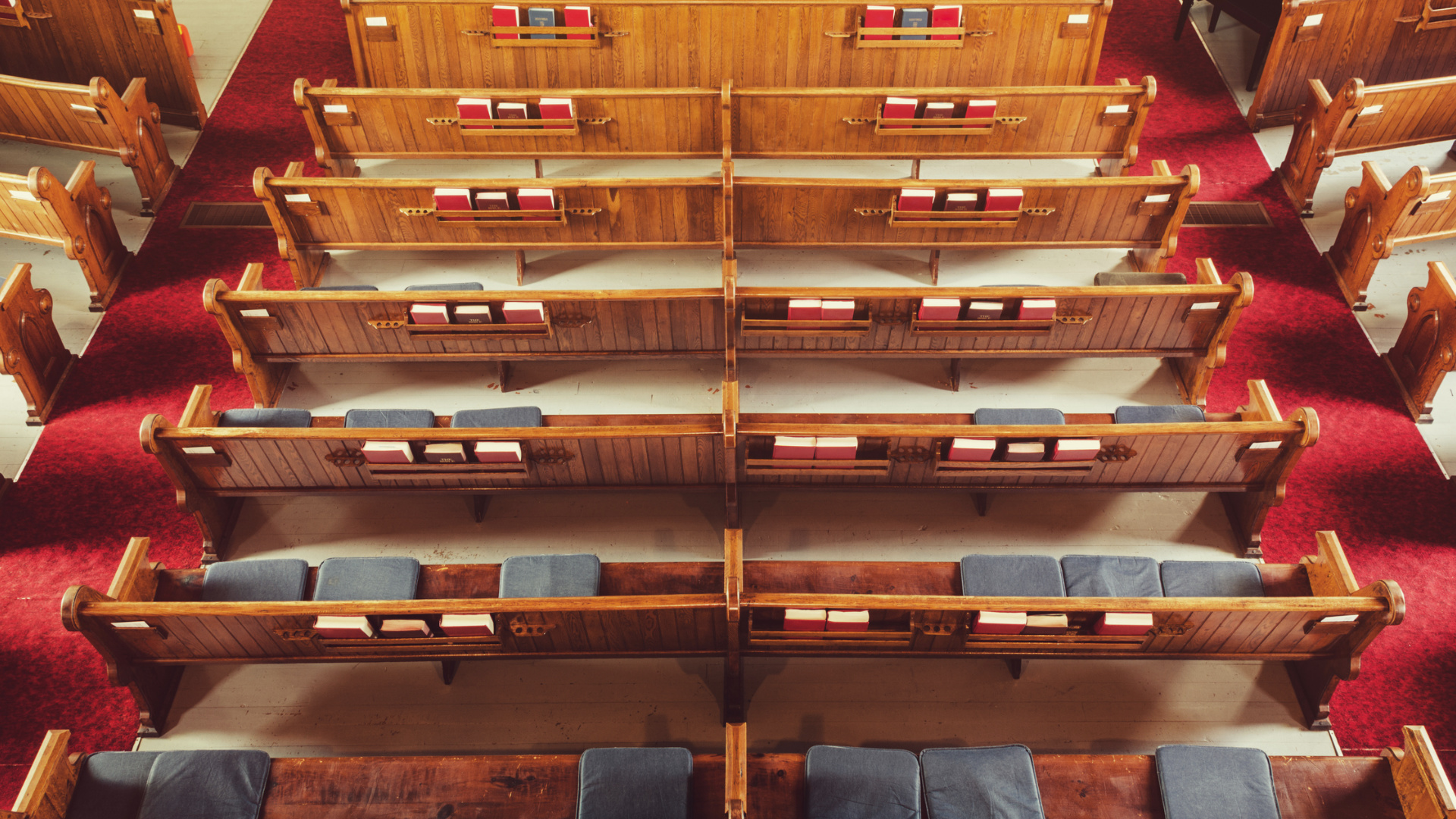Red-padded pews. It’s one of my most vivid memories from growing up in church. Their smell resembled my grandparents’ closet. They weren’t comfortable. They were impossible to nap on during sermons. (Believe me, I tried so hard.)
Today, I don’t miss the rigidity of the wood or the smell. But I miss what they made us do: sit together.
Even if we were tired, daydreaming, or randomly flipping through the hymnals in those pews, we were doing it together: one long row, knees uncomfortably touching, elbows nudging for inside jokes, jockeying to sit next to a crush. It was all done side by side. If you arrived late, there weren’t enough pews left for you to sit by yourself. You had to find a gap in a pew and shimmy in there to find your seat, sometimes closer to other people than you might prefer.
At the time, it was awkward. But looking back, I miss it.
What Solo Chairs Communicate
Today, most contemporary churches have individual chairs with good padding. Even when these chairs are placed side by side, they subtly signal something to churchgoers who walk in: This worship experience is here mainly for you. Your space is your own during worship.
It’s one of the many ways church has become more like Chipotle. Pick your seat. Pick your preaching. Pick your community. Pick everything according to your comfort and preferences. You don’t like that seat? There are plenty of others to choose from.
It may seem like a small change—from communal pews to individual chairs. But in this shift away from pews, we’ve lost something we didn’t realize was forming us.
How Pews Formed Us
The pew didn’t let you hide in isolated comfort. It placed you next to the kid with the runny nose, the out-of-tune girl who thought she should be leading worship, or the guy who stole your crush (completely hypothetical). Proximity was nonnegotiable in the pews. They reminded you, I’m here, and they are too.
Proximity was nonnegotiable in the pews. They reminded you, I’m here, and they are too.
The pews taught me nearness, as uneasy as it could be. They taught me I wasn’t fully alone—that even in boredom, someone was bored with me. I learned how to whisper without being caught and how to hide laughter about a scribbled note. I learned that some people take notes during the sermon and that their handwriting isn’t only legible but thoughtful—as if they came expecting to remember.
In pews, I learned that worship should be communal and that it’s more powerful that way. In pews, I learned not only how to sing hymns but how others can sing them over me. I learned that some tears in dimly lit rooms don’t reveal themselves until you’re close enough to see them glisten or hear the sniffles.
Post-Pew Church
These days, church feels modular and optional. We bypass the close interaction the pews once provided. We often scurry in at the tail end of the first song, just to catch the sermon. We slip out during the benediction, skipping the small talk. We pass each other so quickly in the service that we never learn each other’s names. We come to take exactly what we want, not to receive what we need. We’ve traded the slow, formative friction of community for the fast comforts of individualism.
I’m not necessarily advocating for a pew revival. I’m not demonizing comfy solo chairs. Pews won’t save us. Neither will longer, slightly awkward greeting times, physical hymnals rather than screens, or a more stripped-down worship band. But we should reflect on how these changes are symptomatic of a larger shift in our approach to church in an affluent consumer culture. The pews, in a way, formed us to be a body, a family. In what other ways could we achieve that?
We’ve traded the slow, formative friction of community for the fast comforts of individualism.
Maybe this sort of formation looks less like individualized convenience and more like the holy awkwardness of showing up together—week after week, in rooms too cold or too hot, with our hope and our apathy, with our faith and our doubts. Maybe it looks like sitting next to someone who snores, or sings out of tune, or never remembers your name but calls you “brother” or “sister” anyway. Maybe it means being seated beside a stranger long enough for him or her to become familiar.
Maybe choosing a church to commit to shouldn’t be about how comfortable you feel but about how you can help others feel connected, known, and loved. Maybe serving at church isn’t about what’s easiest or most comfortable but about where help is most needed.
I don’t miss the pews because they smelled great. I miss them because they refused to let me be alone. They reminded me that the church isn’t only about me but I’m part of a larger body—a place not only to believe but to belong.
News Source : https://www.thegospelcoalition.org/article/i-miss-pews/
 Your post is being uploaded. Please don't close or refresh the page.
Your post is being uploaded. Please don't close or refresh the page.





